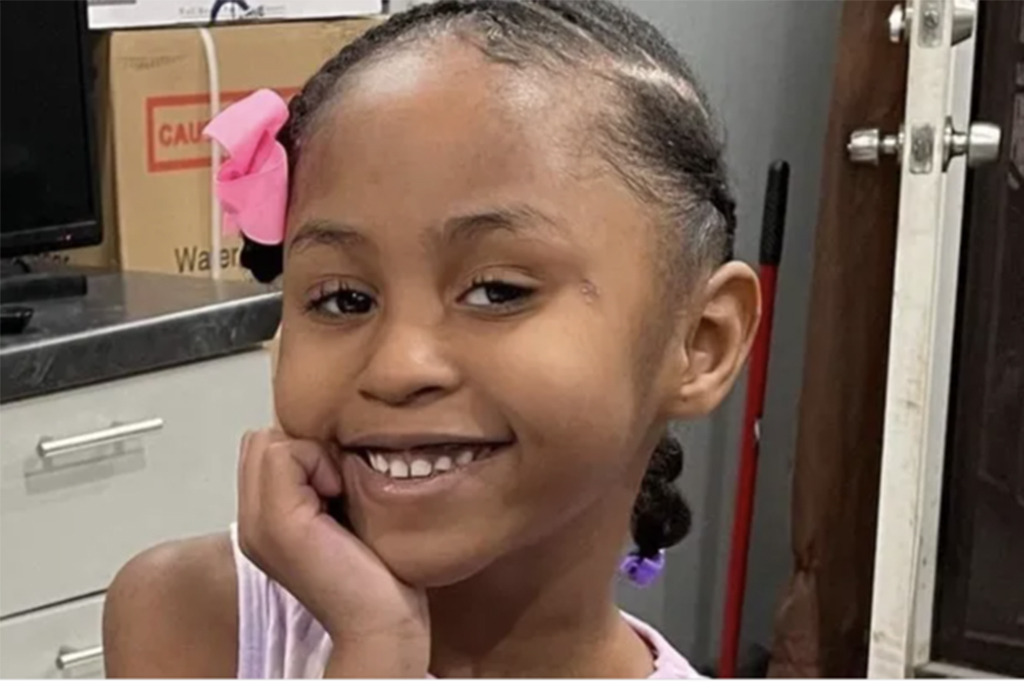Jada Moore: Defunding Child Protection Services Isn't The Answer
Tragic Death Of Jada Moore, 5, Reveals Urgent Need To Uphold Child Protection Services in Black Communities

Source: GoFundMe/Kimberly Elwoods and Catherine Miles
The heart-wrenching death of 5-year-old Jada Moore has brought to the forefront the urgent need to maintain and strengthen child protection services in America, particularly in Black communities where children consistently suffer higher rates of substantiated abuse and fatalities.
Jada’s tragic case involves her grandparents, Klent Elwoods, 62, and Lisa Jones, 57, who now face charges of first-degree murder after subjecting the young girl to multiple injuries resulting from child abuse. The incident unfolded on July 14 when authorities responded to a distressing 911 call reporting an “unresponsive” 5-year-old girl at a residence in Park Forest, Chicago. The Cook County Medical Examiner’s Office confirmed the cause of death as homicide resulting from “multiple injuries due to child abuse.”
In court, it was revealed that Jada’s grandparents had regularly abused her, using methods such as belts, hands and a shoe. They confessed that bedwetting and soiling, common issues among children, were used as excuses to subject Jada to these beatings. This tragedy underscores the necessity for proper child protective services that could have intervened and offered support to Jada’s family before it escalated to this devastating outcome.
Had proper child protective services been in place, Jada’s family could have received crucial intervention and support before this tragedy escalated to this tragic outcome.
Child protection professionals could have played a crucial role in educating Jada’s grandparents about the reasons behind such accidents, addressing potential medical issues, and providing guidance on appropriate responses. Understanding the various factors contributing to bedwetting and soiling could have paved the way for a more compassionate and constructive approach to help Jada through her challenges.
Jada’s story reflects the persistent abuse and child maltreatment fatalities that Black children face at alarmingly higher rates than other groups. The latest federal data shows that 504 Black children died from maltreatment in 2020 – 73 more than in 2019. Black children are three times more likely to die from abuse or neglect than white children. Prior to the COVID-19 pandemic, between 2015 to 2020, a total of 3,146 Black children died as a result of abuse, according to microdata from the National Data Archive on Child Abuse and Neglect. Of that total, 1,812 boys and 1,334 girls were victims. Among the perpetrators, 1,692 were Black men and 2,106 were Black women.
Young Jada’s death occurred in an environment where viral child abuse videos circulate on social media platforms, where urban radio stations joke about childhood beatings, preachers continue to misquote Bible verses to justify physically assaulting children and corporal punishment remains permissible in private and charter schools in just about every state, and public schools in 18 states where many Black parents sign opt-in forms that allow teachers, principals and coaches to beat their kids with wooden paddles.
Meanwhile, against this horrifying backdrop, there have been growing calls to defund child protective services. But the data is clear: Defunding child protective services would only exacerbate the already alarming rates of abuse and deaths among Black children like Jada Moore.
While some advocate for defunding child welfare to address systemic racial issues, it is crucial to recognize that a complete dismantling of these services would leave vulnerable children like Jada at even greater risk. Instead, the focus should be on reforming child protective services to ensure equity, effectiveness, and a family-centered approach that emphasizes support and rehabilitation rather than punishment.
Advocates of defunding often propose reallocating funds to prevention and support programs, aiming for a more holistic approach to address the root causes of child abuse and neglect. They argue for community-based solutions and investments in local initiatives to better address child welfare concerns and provide culturally sensitive support.
Another concern raised by proponents of defunding is the critique of the foster care system, which they see as fraught with shortcomings, including the risk of abuse within foster homes and the emotional toll on separated children. While addressing the issues with the foster care system is essential, defunding child protection services entirely may not be the solution. Instead, efforts should be directed toward improving the foster care system and seeking alternative solutions that prioritize family preservation and community support.
Defunding child protection services is perceived by some as a necessary step to challenge and reform the entire child welfare system, which they view as flawed and discriminatory. They advocate for systemic changes that prioritize social services and equitable support for families to address the deep-rooted issues contributing to child welfare concerns in America.
However, defunding child protection services places vulnerable children at risk. We need a balanced approach that includes both preventive measures and responsive interventions to ensure the safety and well-being of children in need of protection.
Jada’s case serves as a poignant reminder that defunding child welfare is not the solution. Instead, we must prioritize the reform and reinforcement of child protection services, ensuring that they are sensitive to the needs of Black communities and work tirelessly to safeguard vulnerable children from the horrors of intrafamily violence.
And, we must begin to have holistic public health education in our communities about the harms and potential tragic outcomes associated with whupping children. Merely defunding child protective services without viable alternatives would be a disservice to children like Jada and their families.
Dr. Stacey Patton is an award-winning journalist, college professor, and the author of “Spare the Kids: Why Whupping Children Won’t Save Black America.”
SEE ALSO:
Corporal Punishment: It’s Time To Admit That Beating Kids Isn’t The Solution To Crime
Republican Defends Voting No On Bill Banning Corporal Punishment On Disabled Students
















